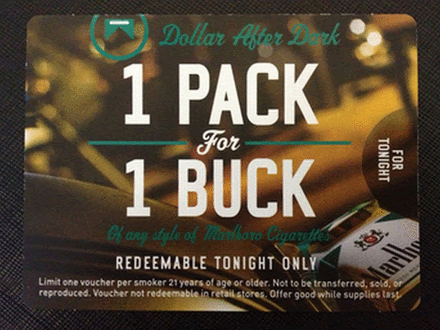

BIG TOBACCO TARGETS THE LGBTQ+ COMMUNITY
The tobacco industry has manipulated LGBTQ+ people for decades to make itself richer at the cost of our health, while sharing some of that wealth with politicians who work against us. But many in our communities have also fought back, as the stories on this page demonstrate.
A HISTORY OF EXPLOITATION
In 1990, the AIDS activist group, ACT-UP, called for a boycott of tobacco company, Philip Morris’s, products — including Marlboro cigarettes – due to its financial support for the notoriously anti-gay Senator Jesse Helms. The boycott ended in mid 1991, with the company agreeing to give donations to AIDS groups while refusing to end its support for Helms. One activist described these contributions as “a few tax-deductible crumbs off Philip Morris’s very well-stacked table.” (During just three months of 1991, Philip Morris reported profits over 70 times greater than their donations to AIDS causes throughout the year.)
“This settlement … represents us taking money from walking over the bodies of those killed by cigarettes. I would characterize this as a pact with the devil.”
– Bill Dobbs, ACT-UP/NY & founder of Fags Against Fags
Philip Morris ran ads in the LGBTQ+ press promoting its AIDS donations. This gave the false impression of supporting the community while the company continued to give significantly larger donations to Helms and other right-wing anti-gay politicians. Recognizing the potential of an untapped market, Philip Morris and other tobacco companies began running product ads in the queer press and donating to LGBTQ+ community groups. In this way they bought the silence of those publications and organizations that might otherwise have called attention to the high rate of tobacco use among the queer population. This same pattern continues today.
Tobacco product addiction in the LGBTQ+ community not only hurts those who are addicted and the people around them, it also hurts the queer community’s struggle for justice and equality. Every dollar spent on tobacco supports an industry that is one of the top corporate funders of right-wing anti-gay politicians.

TARGETED ADVERTISING
The tobacco industry creates ads showing people who look recognizably LGBTQ+ and even alters other ads to make them more likely to appeal to queer people. Tobacco ads in queer publications co-opt the language of our struggle for civil rights. They use rainbows, talk about using tobacco as a freedom on par with love or marriage, and claim that they will accept us. Internally, the industry has called gay people in the Castro “scum,” used drag performers as brand ambassadors, and said that smokers and trans people face similar discrimination. See below for some examples.
Spot the Ad in the LGBTQ+ Publication
Can you guess which one of these ads appeared in a magazine for gay men?
Tobacco companies say they run the same ads everywhere and don’t target specific populations. (Hint: They’re lying.)



Freedom to Marry = Freedom “to Inhale?”
This ad blatantly demonstrates Big Tobacco’s strategy of cynically claiming to support the LGBTQ+ community (while continuing to give massive donations to homophobic politicians).
They would like you to think that the freedom to marry the person you love is equal to the freedom “to inhale,” while ignoring everyone’s right to breathe healthy air.
Exploiting Queer Identities
This ad from an e-cigarette company exploits our pride in queer identities by representing an image of a drag queen and advising us to “Remember to be yourself. Everyone else is taken.”
We take strength from our pride — strength we can use to break free from addiction.


What They Really Think of Us
Internal tobacco company documents reveal what they really think of us. An advertising campaign aimed at gay men in the Castro and homeless people in the Tenderloin was titled Project S.C.U.M.
While the acronym stood for Sub-Culture Urban Marketing, we all know what SCUM means.
SAYING NO TO BIG TOBACCO
Many LGBTQ+ community groups in the Bay Area and beyond have pledged to not accept donations from the tobacco industry. These include national groups, like National Center for Lesbian Rights (NCLR), and local groups that serve an important segment of the community, like Bay Area American Indian Two Spirits (BAAITS) and Lavender Seniors of the East Bay. In other cases, queer community leaders have joined together to successfully end tobacco industry targeting in their cities. Below are a couple of examples.
Stopping Tobacco Coupon Giveaways at Queer Bars

Tobacco company representatives used to go to bars in San Jose to give away e-cigarettes and coupons for heavily discounted cigarettes. One coupon offering “1 Pack for 1 Buck” could only be used at the bar that night. More than one out of every four of the 364 visits to the city’s bars during 2013-14 were to one queer club. When local LGBTQ+ community leaders and other concerned residents spoke out, the city adopted a policy to stop coupon giveaways. San Jose was the last major Bay Area city to take this action, effectively ending this form of tobacco targeting in the Bay Area.
Unfortunately, coupon distribution continues in many other parts of California, and the policy does not stop tobacco retailers from accepting coupons.
Resisting Tobacco Industry Temptation During COVID-19

Orange County Translatinas was offered money in exchange for gathering signatures to attempt to undo the state law that recently passed stopping the sale of most flavored tobacco products.
The group recognized that taking a principled stand was more important than money, despite the financial stresses caused by COVID-19. Not only did they refuse, but they alerted affiliated groups in the Bay Area, such as El/La Para Translatinas and the Transgender Law Center, all of whom stood in solidarity with them.